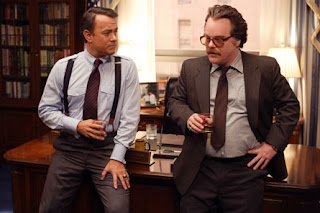Vodka Shooters

There's a fascinating tonal balance to Charlie Wilson's War, visually and narratively. Cinematographer Stephen Goldblatt previously shot Angels In America (also with Wilson's director Mike Nichols) and Path To War, John Frankenheimer's brilliant study of Lyndon Johnson during Vietnam, both for HBO; screenwriter Aaron Sorkin, shot to fame on a group of politically-inflected comedy-dramas that includes A Few Good Men, The American President. and four magisterial seasons of The West Wing; both men, then, are old hands about staging walk-and-talks in the nation's capital, and joined with the misanthropic humanism of Silkwood/Catch 22 director Mike Nichols, one might expect something like a civics lecture, screed, or self-congratulatory harangue, especially in these charged times. Sorkin, Nichols, Greenblatt and their casually cool cast are after something funkier and more ambitious: deadpan satire masked as patriotic allegory. Or is it the other way around? This scratching of my head isn't meant as an insult, but instead, as a hearty pat on the back for a job well-done. In truth, how seriously should we take a 97-minute paean to obscure Congressman Charlie Wilson, even if he does prove that it's possible for a coke-snorting, drunken East Texas politician to get something done in the Middle East? On the other hand, it's a fascinating story full of crazy characters, inane motivations, loopy rationalizations, pissy spies and beautiful belly dancers: like Charlie Wilson, you'd be foolish not to jump into the cinematic hot tub. In taking Wilson's highball-driven spirit-- part sincere political concern, part craven self-interest, generally all fun-- for its own, Charlie Wilson's War offers us politics as a mixture of Nothing Sacred and Tintin, a true screwball delight that packs a hell of a hangover at the end.
Like Wilson, everyone involved in the film is a pro, and is clearly having fun operating at a high level. I liked Sorkin's last television effort, the underrated, unfairly maligned Studio 60 on the Sunset Strip, but it did sometimes feel a little skeletal, less the polished finish of Sorkin's earlier shows than an erratically beautiful sketch that kept promising more than it sometimes delivered. It seems clear watching the film that Sorkin was pouring more of his spirit (and patented wit) into his screenplay than his teleplays, and its a pleasure to see his particular combination of slick cynicism and aching optimism working at full power again. It provides just the right impetus for Tom Hanks to let go of his saintliness, too-- he dives into Sorkin's words with the glee of kid out of school; he hasn't been this relaxed in a role for at least a decade, and you can see the pleasure on his face in hitting the notes of comedy he missed so badly in The Ladykillers. He's well-matched by Julia Roberts' stiletto-edged Texas matron, another case of an actor's delight unleashed by a change-of-pace role.
Phillip Seymour Hoffman has no pace, of course: he's unsafe at any speed, and he's certainly the dark motor of Charlie Wilson's War. Maybe it's just the Washington setting, but he kept evoking Dustin Hoffman to me, particularly the slobbily dressed, chain-smoking mumbler of All The President's Men: like Hoffman's Carl Bernstein, PSH's CIA agent Gust Avrakotos comes on as a cynical fixer, who knows all the secrets and can't be bought, but that exterior hides a quietly thoughtful idealist. He knows, in a way, that they're doomed in their Afghanistan efforts, even if they succeed: he keeps going because making the effort is both his job and his passion, his secret hope for a better world. Everyone else in the film wants to believe in the Hollywood ending they've crafted, but only Gust keeps glancing behind the "MIssion Accomplished" banner. In that sense, Hoffman is the stand-in for the moviegoer, not because he's so "average" compared to Hanks' and Roberts' star power, but because that mixture of hope and cynicism, faith and agnosticism-- to believe in the myths, but also to continue to glance behind the curtain-- so nicely embodies the experience of plunking down your dollars and sitting down in the theater. Gust's mantra is also the mantra and methodology of moviegoing: "We'll see."



Comments